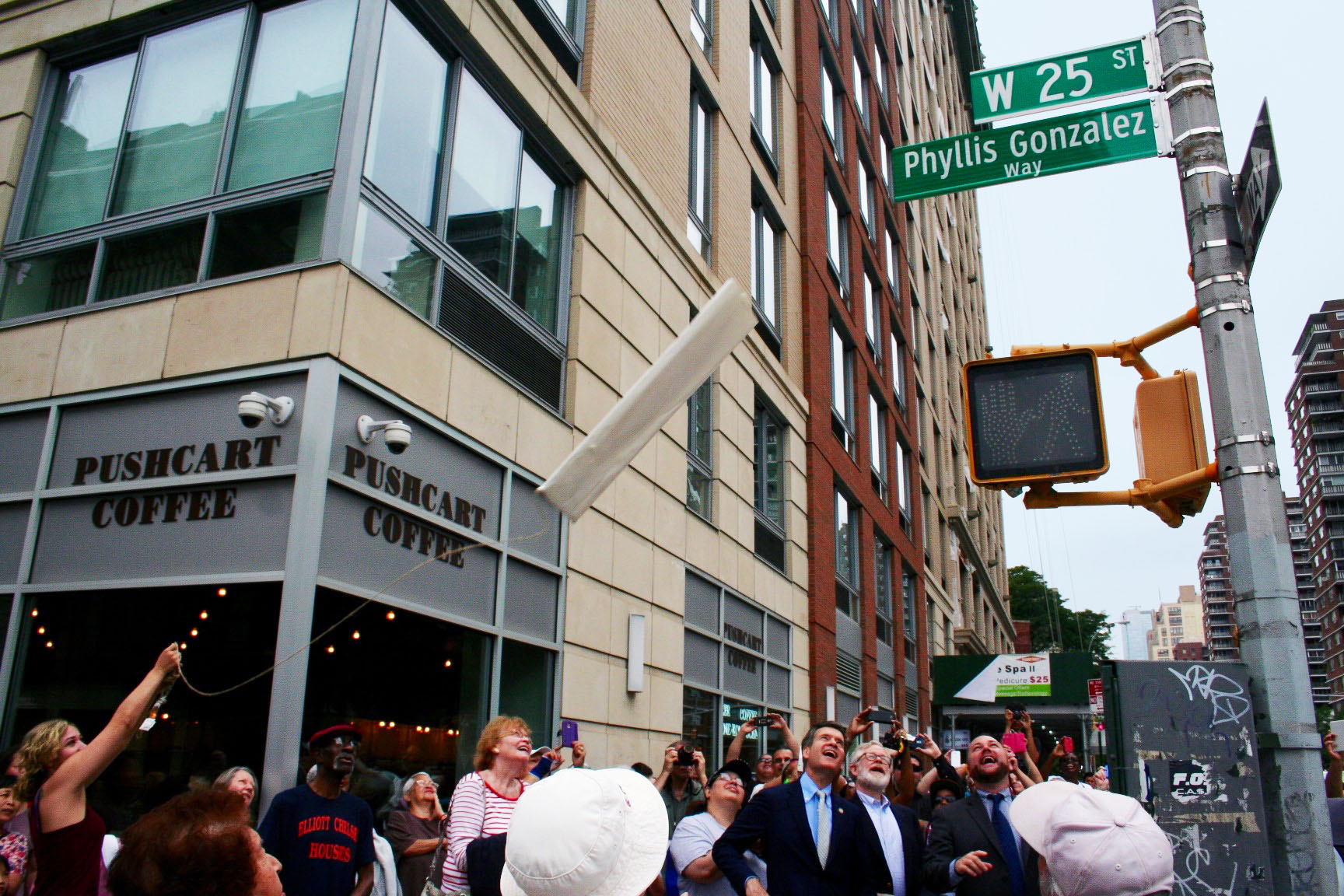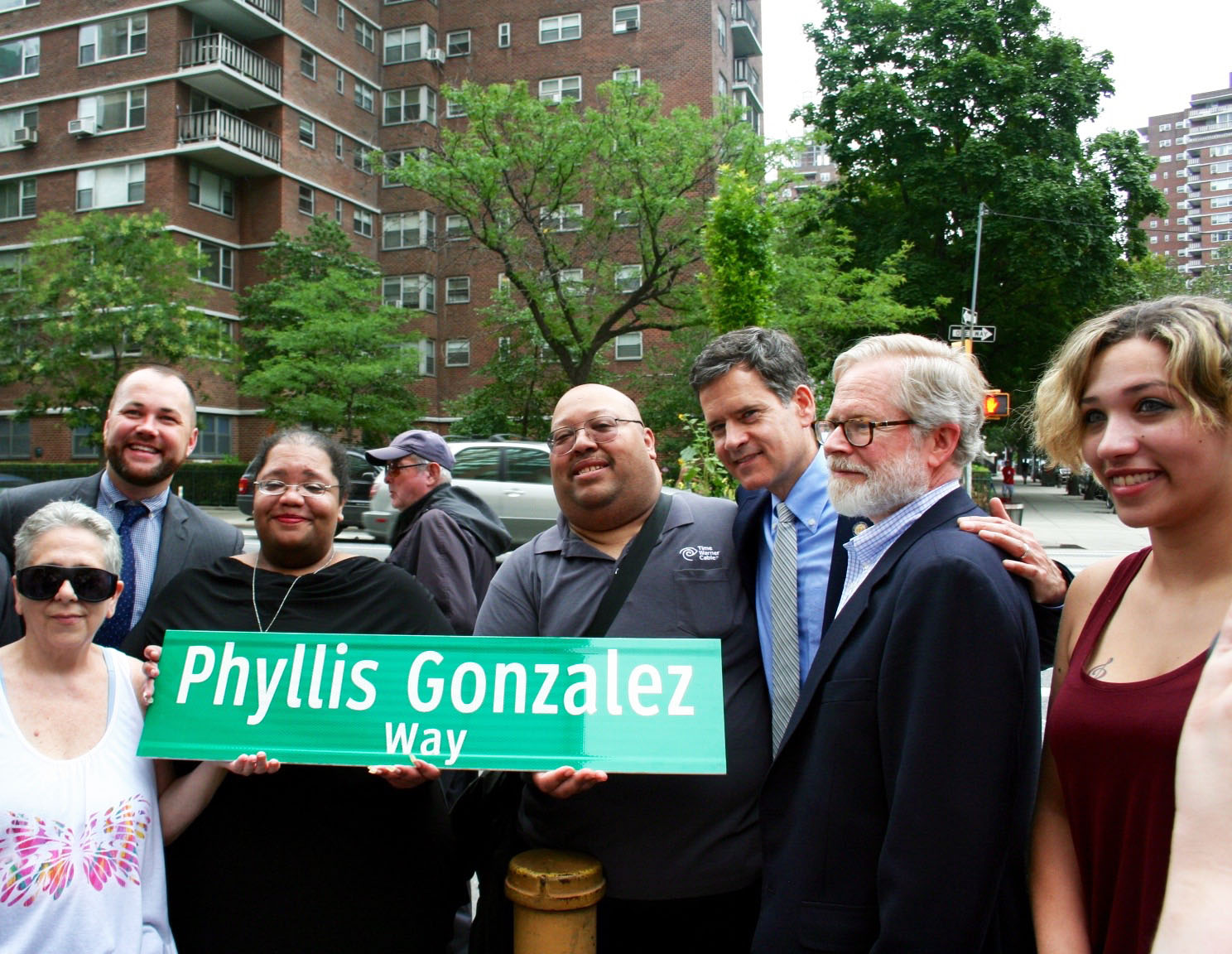
BY YANNIC RACK | It took years of effort by family, friends, elected officials and thousands of locals who singed the petition— but on July 18, the late Phyllis Gonzalez finally got her “Way.”
At the northwest corner of 25th St. and Ninth Ave. — on the same block where she lived for over 30 years — a street renaming ceremony paid tribute to one of Chelsea’s most dedicated housing activists, with the official unveiling of Phyllis Gonzalez Way.
“Phyllis worked on behalf of our neighborhood until the day she passed away, and she will be remembered for her unrelenting pursuit of better lives for people in the community that she loved,” said City Councilmember Corey Johnson, who led the ceremonial.
Phyllis Gonzalez Way now runs past the Elliott-Chelsea Houses, from where Gonzalez set out — in a wheelchair in her later years — to tirelessly advocate on behalf of the residents of her community.
A longtime tenant leader and affordable housing advocate, her career spanned four terms as the president of the Elliott-Chelsea Tenants Association.
She was also a member of Community Board 4 (CB4), served as a social worker at the Hudson Guild and was involved with the local PTA at nearby PS33. Before they were shuttered, she helped residents of the Allerton and Martinique welfare hotels move into the Elliott-Chelsea Houses.
Most of all, however, she was remembered by those at the ceremony as someone who lent a helping hand to anyone in need — whether it meant accompanying them to housing court or opening her own home for a shower, meal or place to rest.
“Ma was the one who helped you, no matter what,” said Marion Gonzalez, her daughter, who attended the renaming with several other family members.

“It really didn’t matter what time of day or night, or if she was in the hospital or not,” Marion added. “People called her in the hospital, going ‘Phyllis, the elevators are busted!’ So she’d call the elevator guy while she’s got oxygen up her nose. Ma just wanted to help. She wanted this neighborhood to be as great as she knew it was.”
Johnson, who (like everyone present) knew Gonzalez personally, recounted how he met her when he became a member of CB4.
“This means a lot to me personally,” said Johnson. “I knew Phyllis very well because of the work that we did together. I was a newcomer on the community board and she was incredibly welcoming and friendly,” he said.
Other officials at the event included State Assemblymember Richard Gottfried, CB4 Chair Christine Berthet, District Leader and former President of the Chelsea Reform Democratic Club (CRDC) Steven Skyles-Mulligan and State Senator Brad Hoylman.
Quoting John F. Kennedy as well as the Bible, the speakers recounted anecdotes that showed Gonzalez’s dedication to causes like affordable housing and the fight against the over-gentrification of Chelsea.
She would often attend community meetings just the day after being released from the hospital, and could regularly be seen buzzing up and down Ninth Ave. on her scooter until late at night.
“I keep thinking as we’re standing here, that if Phyllis were with us, she’d be like, ‘Why are all those people gathered at the corner of 25th and Ninth?’ And we’d be getting calls about that,” Hoylman remarked, to laughter and agreeing nods from the audience.
“She was a jack of all trades, an expert in so many issues that concerned the community,” he added. “She could have been the city councilmember, she could have been the state senator.”
After over thirty minutes of similarly admirable testimonials, loud cheers greeted the unveiling of a new street sign, whose cover was released by Krista Gonzalez, the 20-year-old granddaughter of Phyllis. An identical sign was given to the family.
“Today feels really weird, actually,” Krista said afterwards. “Every time I come by, it’ll be like, ‘What’s up, grandma?’ and then I’ll keep going,” she added.
Gonzalez died of end-stage congestive heart failure at the age of 65 in 2012, the same year she received her second Doris Corrigan Award for community service from the CRDC.
At the time, she was already aware of plans to rename a street after her. But the process ended up taking three years, partly to make sure her family could attend in full.
A rarely achieved honor, candidates for a street renaming must be deceased individuals who had a “significant connection to the local community,” according to the New York Historical Society. Seventy-five percent of local residents must sign a petition in favor of the renaming, which is then sent to the community board (CB4 in this case). If approved, the board sends their request to the Parks Committee of the City Council, then onto a vote in the full City Council (which considers such matters in January and July of each year). The last stop is the mayor’s office, for approval or veto.
Johnson credited Lou Bertot, a fellow housing advocate and long-time friend of Gonzalez, for getting the project off the ground.
“When I campaigned for the [city] council, Lou went door to door with me in every single building in Elliott-Chelsea,” he said.
“At the end, he said to me, ‘I haven’t asked for anything for myself, but the one thing I’m asking for on behalf of the community is I want a street renamed after Phyllis Gonzalez.’ And Lou was the one, on the day that I was sworn in to the council, who called me up and said, ‘When are we getting the street renaming passed?’ ”
On Saturday the sign was already proving its use as a reminder of a neighborhood fixture, as multiple people walking by loudly took notice of it.
“I think there are countless people who live in this community, who were touched by Phyllis,” said Hoylman after the event. “We’ll always remember the impact she had, in little ways and in big ways.”
His sentiment was echoed, and proved, by the late honoree’s son, Eric. “Mom was an inspiration to many, many people,” he recalled, “and she definitely has inspired us [the family]. I worked for Parks and the 10th Precinct, to serve this neighborhood — and that inspiration came from her.”


































